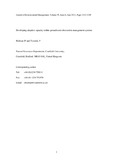JavaScript is disabled for your browser. Some features of this site may not work without it.
| dc.contributor.author | Holman, Ian P. | - |
| dc.contributor.author | Trawick, P. | - |
| dc.date.accessioned | 2012-01-25T23:02:04Z | |
| dc.date.available | 2012-01-25T23:02:04Z | |
| dc.date.issued | 2011-06-30T00:00:00Z | - |
| dc.identifier.citation | Holman I.P. and Trawick, P., Developing adaptive capacity within groundwater abstraction management systems. Journal of Environmental Management, Volume 92, Issue 6, June 2011, Pages 1542-1549 | |
| dc.identifier.issn | 0301-4797 | - |
| dc.identifier.uri | http://dx.doi.org/10.1016/j.jenvman.2011.01.008 | - |
| dc.identifier.uri | http://dspace.lib.cranfield.ac.uk/handle/1826/6889 | |
| dc.description.abstract | Groundwater is a key resource for global agricultural production but is vulnerable to a changing climate. Given significant uncertainty about future impacts, bottom-up approaches for developing adaptive capacity are a more appropriate paradigm than seeking optimal adaptation strategies that assume a high ability to predict future risks or outcomes. This paper analyses the groundwater management practices adopted at multiple scales in East Anglia, UK, to identify wider lessons for developing adaptive capacity within groundwater management. Key elements are (1) horizontal and vertical integration within resource management; (2) making better use of water resources, at all scales, which vary in space and time; (3) embedding adaptation at multiple scales (from farm to national) within an adaptive management framework which allows strategies and management decisions to be updated in the light of changing understanding or conditions; (4) facilitating the ongoing formation through collective action of local Water Abstractor Groups; (5) promoting efficient use of scarce water resources by these groups, so as to increase their power to negotiate over possible short-term license restrictions; (6) controlling abstractions within a sustainable resource management framework, whether at national (regulatory) or at local (Abstractor Group) scales, that takes account of environmental water needs; and (7) reducing non-climate pressures which have the potential to further reduce the availability of usable groundwater. (C) 2011 Elsevier Ltd. All rights reserved. | en_UK |
| dc.language.iso | en_UK | - |
| dc.publisher | Elsevier Science B.V., Amsterdam | en_UK |
| dc.rights | NOTICE: this is the author’s version of a work that was accepted for publication in Journal of Environmental Management. Changes resulting from the publishing process, such as peer review, editing, corrections, structural formatting, and other quality control mechanisms may not be reflected in this document. Changes may have been made to this work since it was submitted for publication. A definitive version was subsequently published in, Journal of Environmental Management, Volume 92, Issue 6, June 2011, Pages 1542-1549. DOI:10.1016/j.jenvman.2011.01.008 | |
| dc.subject | Adaptation Robust Climate change Resilience Vulnerability Social learning climate-change integrated assessment water irrigation england adaptation impacts wales uk recharge | en_UK |
| dc.title | Developing adaptive capacity within groundwater abstraction management systems | en_UK |
| dc.type | Article | - |
Files in this item
This item appears in the following Collection(s)
-
Staff publications (SAS) [906]
